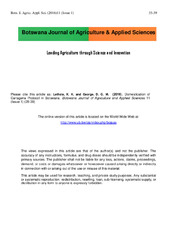Domestication of Cartagena Protocol in Botswana
Abstract
Genetically modified (GM) plants are currently grown in many countries in the world. These crops offer advantages such as improved nutrient composition, and resistance against viruses, fungi, bacteria and insects as well as drought. Despite the advantages that such crops offer, major concerns relating to their use have been raised and these include potential toxicity to humans and environmental impact. To safe guard against these possible adverse effects, the Cartagena Protocol on Biosafety (CPB) was negotiated under Convention on Biological Diversity (CBD) in 1995 and adopted in Montreal, Canada in January, 2000. The CPB was developed to address issues related to the transboundary movement of Living Modified Organisms (LMOs) that may have adverse effect on the conservation and sustainable use of biological diversity. Botswana government has developed the Draft National Biosafety Framework in partnership with United Nations Environmental Programme- Global Environment Facility (UNEP-GEF). The goal is to develop a framework upon which policies on conservation and sustainable use of natural resources and protection of human health would be anchored. To date the National Biosafety Policy has been approved. In this paper we report the activities that have been undertaken to domesticate Cartagena Protocol in Botswana.

